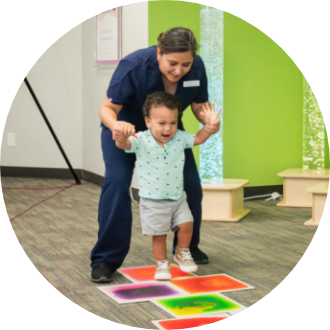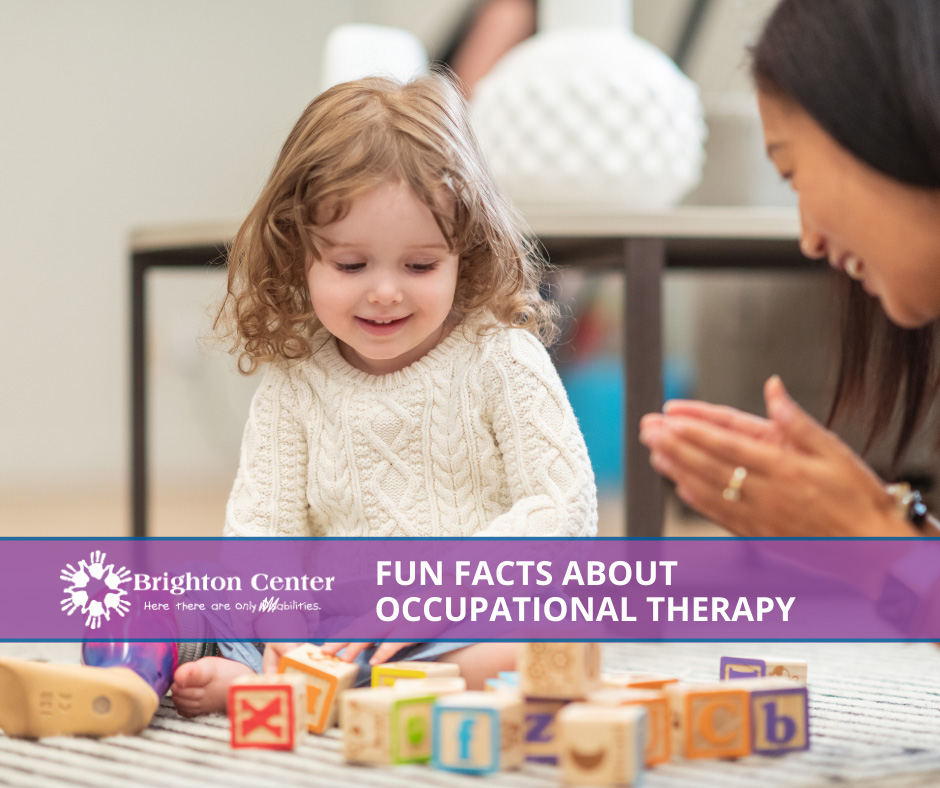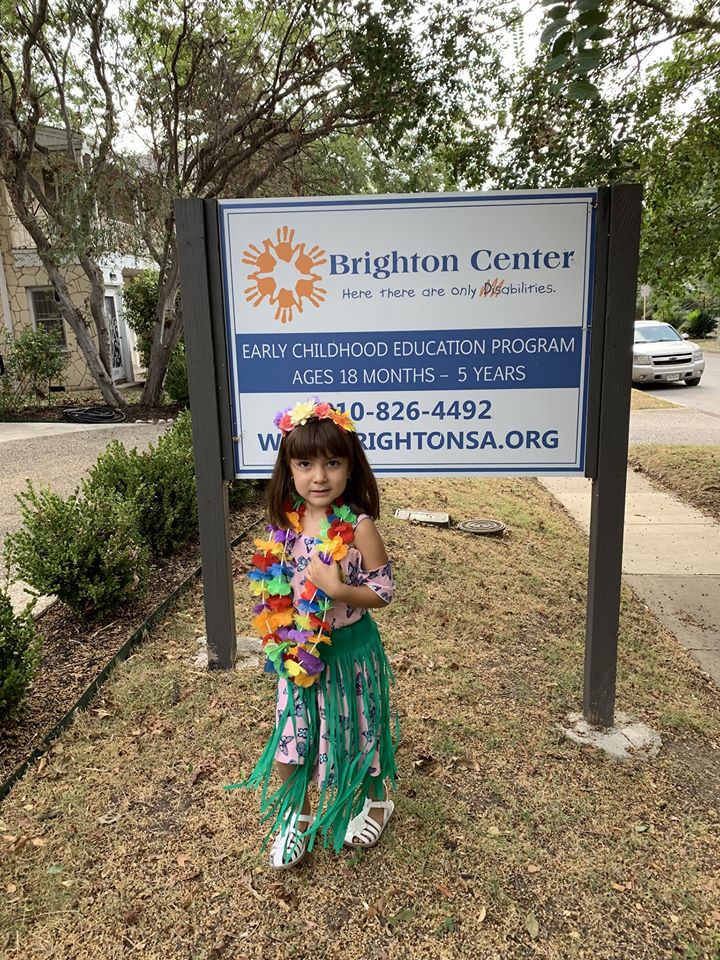Celebrate Your Abilities During National Occupational Therapy Month!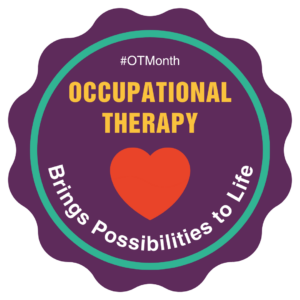
Do YOU know what an Occupational Therapist (OT) does? No, when we perform Occupational Therapy we don’t help you find a job. And no… we aren’t the same as a PT. But OTs help to LIVE LIFE by helping develop and maintain essential abilities.
At Brighton Center, OTs are on a mission to empower children and families to live their best lives!
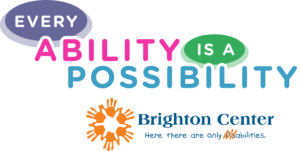 Brighton Center Occupational Therapists help kids participate in their main “occupation”—play! You can also find them helping kids develop their independence. Consequently, this independence develops with self-care tasks, feeding skills, emotional regulation, and executive functioning. In short, by affecting kids’ emotional, social, and physical needs, OTs can help boost their self-esteem and sense of accomplishment.
Brighton Center Occupational Therapists help kids participate in their main “occupation”—play! You can also find them helping kids develop their independence. Consequently, this independence develops with self-care tasks, feeding skills, emotional regulation, and executive functioning. In short, by affecting kids’ emotional, social, and physical needs, OTs can help boost their self-esteem and sense of accomplishment.
Brighton Center is the place where every ability is a possibility for children thanks to the OTs that we have on staff.
 5 Fun Facts About Occupational Therapists by Our Brighton OT’s!
5 Fun Facts About Occupational Therapists by Our Brighton OT’s!
1. What is OT? From the American Occupational Therapy Association: Occupational therapists and occupational therapy assistants focus on the things you want and need to do in your daily life. Occupational therapy intervention uses everyday life activities (occupations) to promote health, well-being, and your ability to participate in the important activities in your life. This includes any meaningful activity that a person wants to accomplish, including taking care of yourself and your family, working, going to school, among many others.
2. Occupational therapy’s first meeting was held in 1917 by the National Society for the Promotion of Occupational Therapy (NSPOT) where 6 people attended. In 2017, OT celebrated 100 years!
3. Occupational therapists first established a role in pediatrics in 1919!
4. OT’s can now be found in all sorts of settings, hospitals, clinics, in-home, pediatrics and geriatrics, including psychiatric facilities and even correctional institutes.
5. Occupational therapists work with all sorts of diagnoses including autism spectrum disorder, cerebral palsy, orthopedic impairments, sensory processing disorders, developmental delays, and more.
5 Additional Fun Facts About Occupational Therapists by Our Brighton OT’s
6. The early start of Occupational Therapy was in the mental health setting! It has ties to the movements for more humane treatment of those with mental health diagnoses, as well as servicing those living in poverty. The movement focused on improving their quality of life and health by engaging them in meaningful occupations from self-care to arts and crafts.
7. OT began to thrive during World War I and World War II where the US Military began recognizing the benefit of using “reconstruction aids” who would use occupation as a means of treatment for wounded soldiers to return to the battlefront.
8. Currently, 83% of OT’s in the US are women. The percentage is slightly higher in pediatrics at 89%. Here at Brighton, 95% of our OT’s are women.
9. Since 2007, entry-level Occupational Therapists must obtain at least a master’s degree, with many programs now offering a doctorate (OTD). Many practicing therapists who obtained their bachelor’s degree in Occupational Therapy before 2007 are grandfathered into practice.
10. The Occupational Therapist’s at Brighton currently have over 150 years of combined experience!
Occupational therapy is not about sitting down on a couch and talking to your therapist about getting a job! Our therapists help children and families to establish and use skills to engage in all the everyday skills that make up their daily lives and activities! Join us this month in celebration of Occupational Therapists. Let’s celebrate the impact they have had in helping children and families live their best lives.
How do I know if my child might benefit from Occupational Therapy?
For kids, playing is their occupation. It helps them explore the world around them, learn to interact with it and develop essential life skills that will allow them to connect with others and do things independently one day. If your child is having trouble mastering skills such as gross motor skills, sensory processing, visual-perceptual skills, and other abilities that will allow them to investigate and navigate their environment on their own then they might benefit from Occupational Therapy Services.
independently one day. If your child is having trouble mastering skills such as gross motor skills, sensory processing, visual-perceptual skills, and other abilities that will allow them to investigate and navigate their environment on their own then they might benefit from Occupational Therapy Services.
What to look for if you are concerned your child might be experiencing some delays:
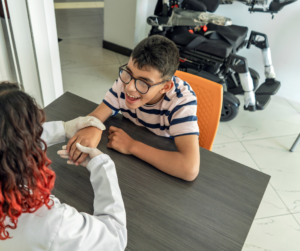
- Difficulty achieving age-appropriate developmental milestones.
- Issues with fine motor skills. Some children struggle with tasks that require strength, control, and dexterity of the small hand muscles. Additionally, kids who have trouble with fine motor skills will have a difficult time with tasks like using scissors, drawing, stringing beads, and using utensils. If fine motor skill issues aren’t addressed, a child with delays in this area could have a hard time performing essential activities like writing and using computers once they enter school.
- Trouble with gross motor skills. Occupational Therapy can also help children who have trouble with gross motor skills, which involve the major muscle groups. Specifically, kids experiencing gross motor skill issues will have difficulties related to balance, strength, endurance, and coordination. In particular, these issues can affect their ability to climb stairs, walk, hop, and play catch, among other activities.
- Sensory processing problems. Children with sensory processing disorders can benefit from pediatric occupational therapy. In fact, if your child seems to overreact to touch, taste, sounds, or smells, that’s a common sign for sensory processing issues and might need occupational therapy. Kids with sensory processing problems might also display under-sensitivity. Furthermore, they may keep seeking out sensations by moving around and touching everything constantly.
